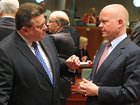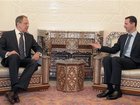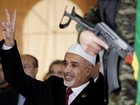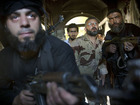Violence in Iraq on Tuesday killed 45 people, after evening attacks raised an earlier toll, the latest in a spate of unrest sparking concerns the country could be sliding back to all-out sectarian war.
The wave of shootings and bombings, which also wounded nearly 100 people, came the same day ministers discussed ways to curb the violence, while the U.N. has urged Iraq's feuding political leaders to resolve long-running disputes that have paralyzed the government and been blamed for its inability to halt the bloodshed.
 Full Story
Full Story
Syrian President Bashar Assad is to give an interview Thursday to al-Manar, the television channel ofHizbullah which has fighters combating alongside government forces inside Syria, his office said.
The interview would be broadcast simultaneously on Syria's official television channels at 9:00 pm (18:00 GMT) on Thursday, the presidency announced on its Facebook page.
 Full Story
Full Story
Israel's Prime Minister Benjamin Netanyahu has ordered his cabinet to stay silent on the issue of Russian missile deliveries to Syria, public radio said on Wednesday.
His remarks came after several ministers criticized Moscow's arms deals with Damascus and raised the possibility of an Israeli response should the Jewish state feel under threat.
 Full Story
Full Story
Egypt's presidency said Tuesday it will submit a proposed law regulating civil society groups to the senate, insisting it reflects the values of the country's democratic uprising despite accusations it is restrictive.
The bill regulating foreign and local non-governmental groups would be submitted on Wednesday to the senate, which also acts as an interim parliament, Walid Zoghby, who helped to draw up the draft legislation, told Agence France Presse.
 Full Story
Full Story
Syria's government on Tuesday slammed an EU decision to lift a ban on supplying arms to rebel fighters as an "obstruction" of efforts to resolve the conflict in the country peacefully.
"The European Union's decision exposes... its obstruction of international efforts to achieve a political settlement to the crisis in Syria," the foreign ministry said in a statement published by state news agency SANA.
 Full Story
Full Story
France insisted Tuesday that the European Union's decision to lift its arms embargo on Syria's rebels was not meant as an aggressive move, after Russia said it would harm peace efforts.
"The decision to lift the embargo was not a belligerent decision, it is in support of a political solution," French foreign ministry spokesman Philippe Lalliot said.
 Full Story
Full Story
Canada's top diplomat Tuesday warned of "more violence, more deaths and more destruction" in Syria that risks spilling over into neighboring countries if the EU arms Syrian rebels.
"My strong view is that the only way to end the suffering of the Syrian people is a political solution," Foreign Affairs Minister John Baird told reporters.
 Full Story
Full Story
Russia said on Tuesday that it was imperative for Iran to join a proposed peace conference on Syria despite reservations from some Western nations such as France.
"The issue of Iran is key for us," Russian news agencies quoted Foreign Minister Sergei Lavrov as saying while on a visit to Paris. "Iran without question is one of the most important nations."
 Full Story
Full Story
Mohamed al-Megaryef, the president of Libya's top political body, resigned on Tuesday to comply with a new law banning Gadhafi-era officials from government jobs.
"Everyone must obey the law out of respect for legality and democracy. I tender my resignation... in conformity with the law," Megaryef told a plenary session of the General National Congress.
 Full Story
Full Story
Foreign Secretary William Hague said on Tuesday that Britain was not bound by any deadline in deciding whether or not to arm the Syrian rebels, after the European Union lifted a weapons embargo.
He repeated that London had yet to decide if it will give the rebels weapons following the EU move late Monday, but he rejected suggestions that it could not do so until after an EU review of its position on August 1.
 Full Story
Full Story



